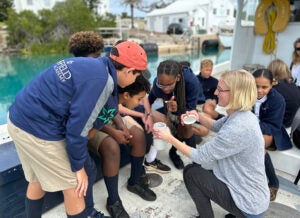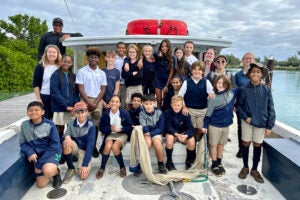Students Identify Organisms With ‘Keys to the Ocean’

A collaboration between Arizona State University’s “Ask A Biologist” website and researchers and educators at BIOS is helping students understand the fundamental concept of taxonomy, or grouping and classifying organisms based on their physical characteristics. Claire Fox (right), BIOS science education officer, designed an online, interactive game that leads players through the use of a dichotomous key, a tool that helps scientists identify unknown organisms—in this case, species of fish or zooplankton found in Bermuda. The game, called “Keys to the Ocean,” is tied into the “Identification Keys” lesson that is offered through BIOS’s Curriculum Enrichment Program as a 2.5-hour workshop, which includes the opportunity for students to conduct a plankton tow aboard a research vessel and view live plankton under microscopes.The history of taxonomy—or the science of naming, describing, and classifying organisms—is as old as human language and speaks to a fundamental desire to understand and bring order to the natural world. A new online game developed in partnership between Arizona State University’s (ASU’s) Ask A Biologist website and BIOS is combining this fascination with ongoing research to teach students how to use a dichotomous key, a tool that helps scientists identify unknown organisms.
Knowing how to correctly use a dichotomous key is a skill required in many scientific fields, as well as by both US and British education standards. A dichotomous key (dich- means “two” in Greek) is a specific type of identification key that presents the user with two, mutually exclusive, choices about an observable characteristic of the organism. For a fish, this might include characteristics such as body shape, tooth structure, and fin shape. As the user makes a choice about each characteristic, they proceed through a decision tree until the final answer—the name of the organism—is reached.
“As a researcher, I have been using this kind of key for my entire career, beginning with very old ones written in French from the 1930s,” said Leocadio Blanco-Bercial, a zooplankton ecologist at BIOS. “We continue using them to characterize species and biodiversity, so this is a great starting point for younger students to get an idea of how we work and what we do.”
Blanco-Bercial is also the principal investigator on a National Science Foundation (NSF) grant that is supporting collaborative research with ASU into the role that zooplankton play in the ocean’s biological pump. This process moves carbon from the ocean’s surface to deeper waters and, ultimately, influences the global climate system. As part of the research project, high-resolution images of zooplankton are collected for an online taxonomic identification catalog, as well as the development of learning resources.

In January 2023, M1 (U.S. grade 6) students from Somersfield Academy visited BIOS and played the “Keys to the Ocean” game as part of their science curriculum. “Student groups have been our beta testers throughout the design process of this game and have been great at providing constructive feedback,” Fox said. “They have been so enthusiastic about playing a computer game that is all about Bermuda’s marine animals and ties in with what they are learning back in their classroom.”
During the pandemic when there was a need for online learning opportunities, BIOS’s Ocean Academy added a variety of virtual field trips to their education program lineup. One addition was a lesson on “Identification Keys” that aligned to the science curricula in Bermuda’s public and private schools. Working with a BIOS educator, students chose whether to identify a Bermuda fish or zooplankton species and constructed a dichotomous key using linked PowerPoint slides.
“They enjoyed the interaction and got excited about the topic,” said Claire Fox, BIOS education officer. “This inspired us to create a computer game to take the lesson to the next level and the ‘Ask A Biologist’ website was a natural place to host the game.”
“Keys to the Ocean”
“Ask A Biologist” was created by ASU’s School of Life Sciences in 1997 as a biology learning tool for parents, students, and teachers. Funded in part by NSF and the National Science Digital Library, the website comprises activities, games, images, and stories and is visited, on average, over 110,000 times each day. True to the page’s name, it also features a section where you can submit a biology-related question. In the website’s 25-year history, volunteer biologists have replied to more than 45,000 questions.
With funding from Blanco-Bercial’s NSF grant, as well as a related NSF grant led oceanographer Susanne Neuer, director of ASU’s School of Ocean Futures, Fox outlined the idea for an online game that would debut on “Ask A Biologist” and support the goals of the collaborative research project. Specifically, to “make a more complicated taxonomic decision tree based on zooplankton,” said Amy Maas, a comparative physiologist and biological oceanographer at BIOS and co-principal investigator with Blanco-Bercial.
Fox began collaborating with Karla Moeller, executive educational outreach coordinator at ASU and managing editor of “Ask A Biologist,” and Sabine Deviche, the illustrator and game developer responsible for the creation of many learning tools currently featured on the website. To lay the foundation for the plankton portion of the game, Fox provided Deviche with a library of detailed zooplankton images. Many of these were taken by BIOS research technician Hannah Gossner and Yuuki Niimi, a doctoral student in Neuer’s lab who frequently travels to Bermuda to work with both Blanco-Bercial and Maas.
“We had a little trouble with the plankton key because the terms were very scientific and some of the photos don’t look like anything you’re used to seeing, so it was hard to know if you were looking at a spine or a leg,” Deviche said. Being able to correctly identify a characteristic is vital to being able to use a dichotomous key.
The bulk of the development took about three months, with a few more months to fine-tune to details. In January 2023, the game, “Keys to the Ocean,” was ready to be piloted in a laptop-based version.
Putting it to the Test
On January 25, 20 students from two M1 classes (U.S. grade 6) at Somersfield Academy took a field trip to BIOS. Their visit included the newly redesigned “Identification Keys” lesson, which combined the “Keys to the Ocean” game with a hands-on plankton lab that provided students with the opportunity to conduct a plankton tow aboard a BIOS research boat and see live zooplankton under microscopes.
After providing an introduction to taxonomic keys, Fox led the students as a group through the fish identification game. The class heard an overview of plankton before heading out to collect plankton and returning to the lab to examine their samples. In pairs, the students explored the “Learn the Features” section of the game to familiarize themselves with the scientific terminology used to describe zooplankton. With this knowledge, they played the plankton identification game, and were awarded points for correct answers and speed. At the end of the lesson, the class reviewed their results and discussed which zooplankton had been incorrectly identified and why. They also shared thoughts on how the game could be improved.
“Student groups have been our beta testers throughout the design process of this game and have been great at providing constructive feedback,” Fox said. “They have been so enthusiastic about playing a computer game that is all about Bermuda’s marine animals and ties in with what they are learning back in their science classroom. I enjoyed combining the hands-on plankton lab with this interactive game to help students get excited about using identification keys.”
“Part of the M1 science curriculum looks at taxonomy, classification and the use of dichotomous keys,” said Sharlene Young, science teacher at Somersfield. “The trip to BIOS was a perfect introduction to the use of keys, which allowed them to use specific characteristics to identify both fish and plankton by using a new interactive software. The students had an amazing time and learned a lot.”

“Keys to the Ocean” is featured on the “Ask A Biologist” website and linked to a story on taxonomy. The game leverages an ongoing research project, funded by the National Science Foundation, that seeks to understand the role of zooplankton in transporting carbon to the deep ocean—a process that impacts the global climate system. The collaborative project involves scientists and educators from ASU and BIOS, including BIOS zooplankton ecologist Leocadio Blanco-Bercial, who has used taxonomic keys throughout his career and said: “this game is a great starting point for younger students to get an idea of how we work and what we do.”
Finishing Touches
Since January, Deviche has been incorporating additional feedback into the game and testing the online interface. The game is also linked to a story on taxonomy on “Ask A Biologist” and a new, related story is in the works.
“It’s great to see nice pictures instead of black and white diagrams, which are often difficult to interpret, even for people working in this field of study,” Blanco-Bercial said.
“Keys to the Ocean” is tied into the “Identification Keys” lesson that is offered through BIOS’s Curriculum Enrichment Program as either a 2.5-hour workshop or a 45-minute virtual lesson.
“Utilizing Ocean Academy students to test curated lessons based on BIOS research has truly optimized this online resource,” said Kaitlin NoyesKaitlin Noyes, BIOS director of education and community engagement and co-principal investigator on the grant. “The BIOS education team is excited for an opportunity to take this resource global and continue to work alongside the ‘Ask A Biologist’ team.”
